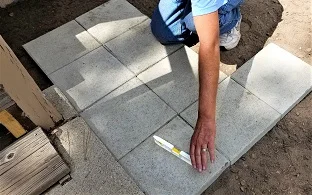How a Concrete Driveway Cost Calculator Works and Why Do You Need It?
A concrete driveway calculator is used to calculate the volume of concrete used to lay the driveway. Similarly, a concrete driveway cost calculator reveals the cost that comes in buying the required amount of concrete.
A concrete driveway is a paved surface for parking vehicles or walking on. This area is paved directly from a public road, leading to the home or garage. It is called a concrete driveway because of the concrete base spread over its prepared base, which is reinforced with rebar or wire mesh.
People prefer concrete driveways because they last longer. Their durability extends to twenty-five years or above. Concrete driveways can handle heavy cars with minimal maintenance. Moreover, its surface looks clean and stable, which resists in every weather condition
When you are planning a new driveway, cost is a crucial factor. First of all, people need to know how much material they should buy and what the overall expense will be. The concrete driveway cost calculator has thus gained popularity among contractors and builders.
Concrete Driveway Cost Calculator
The concrete driveway cost calculator is an online calculating tool, you can use to estimate how much your driveway will cost. Its working is quite easy and simple, and the interface is also user-friendly that anyone other than a contractor can use it. Not exact, but somehow, it gives you a nearly accurate estimate for installing a new driveway or remodeling the previous one. It asks a few dimensions and provides the results within seconds.How Does the Concrete Driveway Calculator Cost Estimate Work?
This online calculating tool fetches some important details from you and then calculates it using its internally built formulas and gives you the answer.What Does the Calculator Ask?
The very first things this calculator requires are “Concrete Driveway Dimensions”. This includes the length, width, and thickness of the driveway. It also asks some extra options:- The type of concrete finish, whether it is plain, stenciled, etc.
- Is there a slope or not
- Gravel depth
- Edge rebar spacing, rebar rebar spacing, and single rebar spacing
- The market cost of cement, gravel, and rebar
- Driveway entry point from the footpath
- Base enforcement
- Labor cost
How to Use the Calculator?
The Concrete Driveway cost calculator is very easy to use. It requires some details to give you the estimate. All you need is a proper measurement of the area where and for how much length, width, and girth driveway you need. The next option is to add the price per cubic yard of concrete in your area. When you enter the details and click on the calculate button, you will get an exact estimate of how much volume of concrete is required to fill the area and how much it will cost you. One important thing while using the concrete driveway calculator cost estimation is, you have to check the units you are using. Although it depends on the units you have used to calculate the area but you have to set the same units in the calculator too. One single mistake in units editing can change your answer by a large number.Example
Let’s say your driveway is 40 feet long and 60 feet wide, and you want a concrete thickness of 4 inches. Four to six inches is the minimum thickness used for residential driveways. However, this thickness increases depending on the use of the driveway and how many heavy vehicles will use the way. So if we go with the example, length 40 feet and width 60 feet. It will be calculated this way.- Find the surface area
- Convert thickness into feet
- Calculate the volume
- Convert cubic feet to cubic yards
- Calculating the Cost
Calculate the Cost of a Concrete Driveway With a Cost Calculator
If you are planning to build a concrete driveway, we recommend that you calculate the volume of concrete needed to cover the driveway and the cost first using the concrete volume calculator. There are several benefits of using these online tools, and they serve in different way.- The calculator gives a rough but somehow accurate estimate. There might be a small difference in the results, but you can still plan your budget because it gives you a small starting point by keeping the average estimate in mind.
- It saves your time by giving you an instant answer.
- When you get the estimate of how much material is required, you buy accordingly, this thing reduces the risk of buying too much or too less for the project. Buying too much is an issue in itself as it causes unnecessary wastage, and buying less again causes an issue of delaying the work.
- If you are a homeowner and discussing the project with contractors, it gives you better position in the discussion. You already know the amount needed and how much it will cost. This thing brings a big difference in negotiations, because you are not relying only on the contractor’s estimate. You can compare their quote with your own estimate and quickly see if their demand is suitable or not.
Frequently Asked Questions
What does a concrete driveway cost calculator do?
The concrete driveway cost calculator gives an estimate of how much concrete you need for your driveway and gives you a rough cost based on the size and thickness you enter.Why is driveway thickness a necessary part of calculating the concrete driveway cost?
Driveway thickness is important because it affects the overall calculation of the concrete volume needed for the construction. A standard driveway is four to six inches thick. This thickness can be increased depending on the types of vehicles and the usage of the driveway.Does the concrete driveway cost calculator include labor and finishing costs?
No, the concrete driveway cost calculator does not include any labor and finishing costs. It is a tool that just provides you with an estimate of the concrete volume and its cost.Should I still get a contractor’s quote if I use the concrete calculator?
Yes. The calculator gives just a starting estimate of concrete volume and price excluding extra costs. You should get a contractor’s quote because it will include site preparation, labor, and design details.Alex Morgan is a home improvement enthusiast from the U.S. who loves simplifying complex calculations for builders and DIYers. At TogCalculator.com, Alex shares easy-to-use guides and accurate calculator tools that help homeowners plan smarter projects. His goal is to make construction math simple, reliable, and stress-free for everyone.











